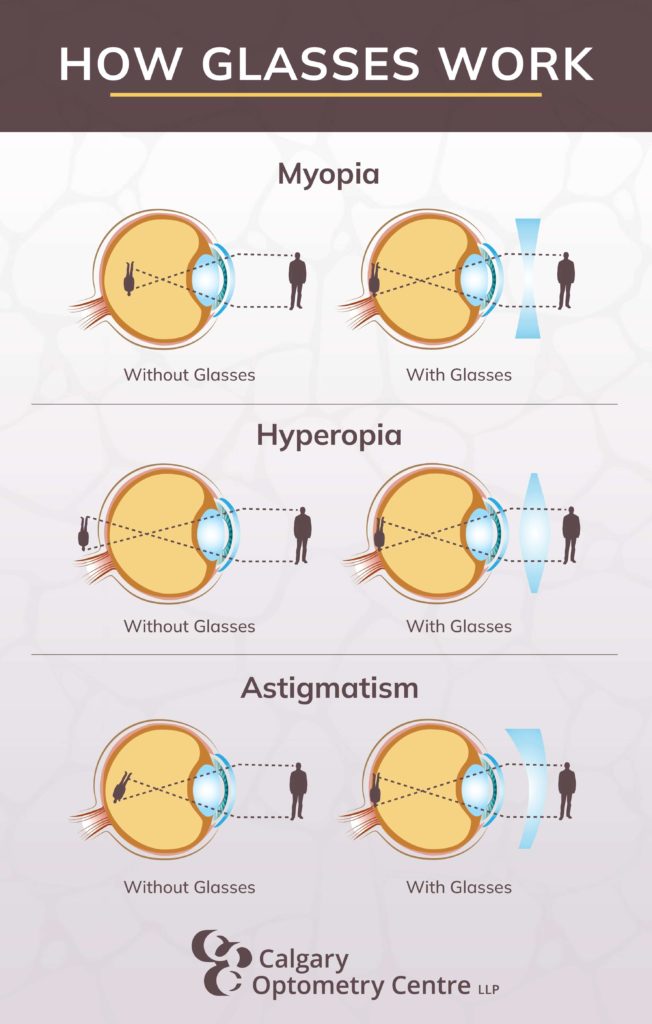Have you ever wondered if not wearing your glasses can make your vision worse? If so, you’re not alone. Many people worry that neglecting their glasses might lead to deteriorating eyesight.
While the answer generally is no, not wearing your glasses doesn’t lead to any particular damage to your vision, it does mean your eyes have to work harder, possibly leading to problems with eye strain or blurry, unclear vision.
At Calgary Optometry Centre, we’re breaking down what glasses do, how they work, and what not wearing them could lead to.
What Do Glasses Do?
Glasses are designed to correct vision problems by adjusting the way light enters your eyes. The lenses in your glasses bend (or refract) light rays so that they focus precisely on your retina, the light-sensitive layer at the back of your eye, a focus correction that helps you see clearly, depending on your eye care needs.
Types of Lenses
There are various types of lenses for different vision issues. For instance, concave lenses correct nearsightedness (myopia), while convex lenses address farsightedness (hyperopia). Additionally, multifocal lenses help those with presbyopia, a condition that makes it difficult to focus on close objects.
What Are the Benefits of Glasses?
Wearing glasses provides immediate benefits, including clearer vision and reduced eye strain. They can significantly improve your quality of life, making daily activities like reading and driving much easier and safer.
Depending on the reason you are wearing glasses in the first place—myopia, hyperopia, astigmatism—the likelihood of increased eye strain and blurry vision increases. For children or those using glasses to correct an eye condition, not wearing your glasses could prevent your eyes from developing properly, particularly if you have lazy or crossed eyes.

Will My Eyes Get Worse with Glasses?
A common myth is that wearing glasses will weaken your eyes, causing your vision to worsen over time. This is not true. Glasses simply correct your vision while you wear them.
Unless your prescription is specifically designed to treat a vision or development issue, like strabismus or amblyopia, glasses wearing or not wearing doesn’t affect the underlying structure of your eyes. Instead, they act as corrective devices which allow you to see clearly.
Why Is My Vision Worse When I Don’t Wear My Glasses?
When you wear glasses, your eyes adjust to seeing clearly, and taking them off can make your uncorrected vision seem worse. This doesn’t mean your eyes are dependent on glasses; it’s just that you notice the difference more. There are a few reasons for this:
- Perception of Clarity: When you wear glasses regularly, your brain gets accustomed to clear vision. Removing them can make your natural vision seem blurrier by contrast, but it hasn’t actually worsened.
- Adjusting Focus: Your eyes might struggle to refocus without glasses, leading to temporary discomfort and difficulty seeing.
- Eye Strain: Without corrective lenses, you may squint or strain to see clearly, which can cause headaches and fatigue.
What Happens if My Vision Is Worse After Using Glasses?
There are some factors to consider if you notice a reduction in vision clarity after using your glasses:
- Initial Adjustment: It’s normal for your eyes to take some time to adjust to new glasses. This adjustment period can make your vision seem worse temporarily.
- Incorrect Prescription: An incorrect prescription can strain your eyes and affect your vision. If you experience persistent issues, revisit your eye care professional for a re-evaluation.
- Overcorrection: Sometimes, overcorrection in your lenses can lead to discomfort and blurry vision. Always ensure your prescription is accurately filled.

Do I Have to Wear Glasses Forever?
Glasses are not meant to be a tool you feel you can never part with. But if you need glasses to see clearly, there will be built in benefits to wearing them frequently. Some factors to consider:
- Lifestyle Choices: Depending on your vision needs and lifestyle choices, glasses may only be needed for certain activities like reading or driving. For ease and comfort, however, you may opt to wear them more frequently or to reduce the risk of losing or misplacing them.
- Glasses Alternatives: If you dislike wearing glasses, contact lenses are a popular alternative. They offer the same vision correction without the frames. For active people, contacts can be beneficial when in humid or sweaty conditions.
- Surgical Options: Surgical options like LASIK could correct vision issues. However, these procedures should be discussed thoroughly with a healthcare provider.
So, What Makes Eyesight Worse?
Although wearing or not wearing glasses won’t make your eyesight worse or better, they do improve your vision by allowing you to see clearly. Eyesight can be impacted by a various factors though, like:
- Natural Aging: Aging is the primary factor that affects vision. Most people experience changes in eyesight as they get older—a condition known as presbyopia—which is inevitable and is not affected by your history of vision correction.
- Environment: Prolonged exposure to screens, poor lighting, and lack of eye protection can strain your eyes. Make sure to take regular breaks from screens and use appropriate lighting.
- Health Conditions: Certain health conditions, like diabetes and high blood pressure, can affect your vision. Regular checkups can help manage these conditions and protect your eyesight.
How We Can Help
Glasses are an effective tool for correcting vision, but they do not worsen or permanently improve it. Alternatives like contact lenses or even surgical options are available for those who prefer not to wear glasses. Regular eye checkups, a healthy lifestyle, and protecting your eyes from strain are essential steps for maintaining good vision. At Calgary Optometry Centre, we’ve been providing innovative technology, quality products, and exceptional service since 1982. Come visit us to learn more about how we can help you correct or improve your vision.




